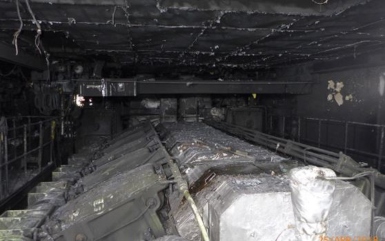
At 2003 on 16 April 2018, the Lithuanian registered ro-ro cargo vessel Finlandia Seaways sufered a catastrophic main engine failure that caused serious structural damage to the engine and a fire in the engine room. The vessel’s third engineer, who was on duty in the engine room at the time, sufered serious smoke-related lung, kidney and eye injuries during his escape.
Finlandia Seaways was 11nm east of Lowestoft on a regular voyage from Zeebrugge to Rosyth when one of the main engine’s connecting rods broke. Several of the engine’s major internal rotating components were thrown through the side of the crankcase into the engine room, and a short but intense fire occurred. Within 20 minutes the crew had conducted a muster, sealed the engine room, activated its carbon dioxide fxed fire-fighting system and extinguished the fire. The third engineer was recovered by coastguard helicopter to Norfolk and Norwich hospital for medical care, and made a successful recovery.
The MAIB’s technical investigation was carried out with support of the Lithuanian Transport Accident and Incident Investigation Division and the engine manufacturer, MAN Diesel and Turbo SE. The investigation identifed that a fracture of the connecting rod small end had led to the sudden failure of the main engine. The investigation also found that the method
used to replace the connecting rod small end piston pin bearing bushes by the vessel manager’s maintenance support contractor had introduced stress raisers that signfcantly increased the likelihood of crack initiation and fatigue failure.
Other factors that contributed to the engine failure included: standards of maintenance management; lack of appreciation of the importance of following the engine manufacturer’s instructions for the removal and reftting of the piston pin bearing bushes; and external oversight of the engine maintenance process.
With regard to the emergency response, although the carbon dioxide fire-fighting system was activated successfully, the third engineer was fortunate to have survived given that there were no emergency escape breathing devices on his escape route. In common with other accidents in which carbon dioxide has been released following a fire, the inability to confrm which gas bottles had discharged hampered re-entry to the engine room. In addition to this, the voyage data recorder did not record the incident due to the uninterruptible power supply failing.
On 27 July 2018, the MAIB and the Lithuanian Transport Accident and Incident Investigation Division wrote to MAN Diesel and Turbo SE and the vessel’s classifcation society recommending that they provide technical advice to Finlandia Seaways’ operator to reduce the likelihood of a similar accident occurring in the future. In response, Finlandia Seaways’ sister vessel was withdrawn from service and its engine connecting rods removed and replaced. In addition to many actions taken by stakeholders as a result of this accident, further recommendations aimed at addressing the safety issues raised in this report have been made to the vessel operators, DFDS Seaways AB-Lithuania and its engine maintenance support contractor, Diesel Service Group.
Safety Issues
– the engine’s connecting rods had not been maintained in accordance engine manufacturer’s instructions;
– defects introduced during component overhauls had not been identified by the ship’s crew or the company’s technical superintendents;
– the significance of the damage caused to the connecting rod small ends during overhaul was not fully appreciated and although a Class survey item, Class was not kept informed;
– there were no emergency escape breathing devices on the secondary escape route used by the third engineer.
Recommendations
A recommendation was made to MAN Energy Solutions and Lloyd’s Register (2018/121) to provide technical advice to DFDS on the actions the company should take to minimise the risk of a similar catastrophic engine failure, and any other vessel operators whose MAN engines might have been subjected to similar maintenance practices.
Further recommendations aimed at addressing the safety issues raised in this report have been made to the vessel operators, DFDS Seaways AB-Lithuania and its engine maintenance support contractor (2021/102), Diesel Service Group (2021/103-105).
Download the report in full: MAIB-FinlandiaSeaways-Report
Download the report annexes: MAIB-FinlandiaSeaways-Annexes
Read another article related to accident reports: Engine failure caused fire on another towing vessel says NTSB report